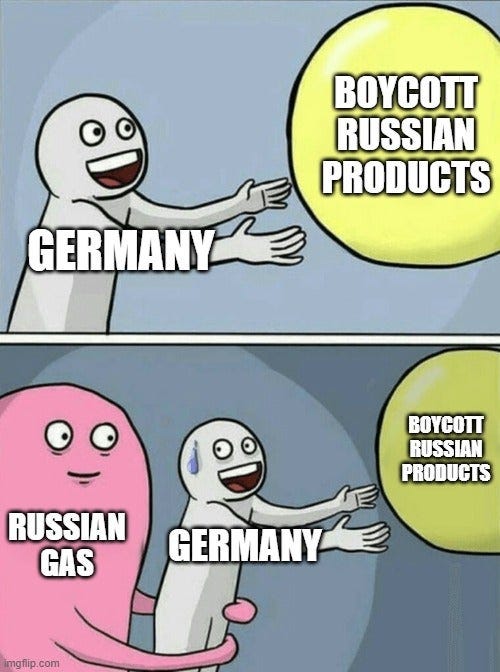Market Munch 🍕 | July 12 2022
$39bn of investor money goes bye-bye, Russia gives Germany a prolonged heart-attack, and Amazon preps for a 'Prime' earnings season.
Good morning Munchers!
Here is your daily dose of the news that will help you sound smarter at parties - In 6 minutes and 3 seconds.
Let’s dive in.
What’s hot, what’s not
Market Commentary
US markets slide a little bit. No major trigger except for the fact that China is enforcing lockdowns to combat a re-surge in COVID.
Sentiment has swung to a narrative around the fact that aggressive economic tightening is needed to calm inflation down, but gives us the risk of a policy-induced recession.
Markets have priced in rates of up to 3.5% in early ‘23, down from an earlier-expected 3.9%.
Story Roundup
1 - Klarna’s sees $39b in investor money evaporate. 💸
Buy now, pay later fintech Klarna just raised $800m from the UAE’s sovereign wealth fund, Canada’s Pension Board and Sequoia at a valuation of $6.7bn.
Just a year back, their valuation stood at $46bn (after a round ironically led by SoftBank).
Flash forward to today, and investors at the height of it are sitting on a 86% loss.
A slumped valuation is just another part of the dimming market for risk assets as investors rotate away from 'long shots' to businesses that are fundamentally strong.
BNPL has been hit hard as
- discretionary spending slowly recedes
- global interest rates creep higher
- the likelihood of client default increases
All of this screws up margins that were already TIGHT.
For investors, it looks like BNPL stands for Buy now, profit later?
(Sike, you’re never getting your money back)
2 - Russia turns off Germany’s gas pipeline for a sec. 🛢️
Nord Stream 1 is a gas pipeline connecting Russia to Germany - and it’s pretty important.
Russia is Germany’s top gas supplier - supplying about a third of the country’s natural gas needs.
Yesterday, the pipeline went offline for scheduled repairs and officials have one big question.
Will gas flow resume?
German officials admitted that they “are getting mixed signals from Russia” and “have no idea” whether Russia owned Gazprom will restart gas delivery.
This comes in light of an increasingly troubled relationship between Mr. Putin and the rest of Europe surrounding energy - as supplies to Italy were also cut by a third.
Europe’s gas storage is hindered - and at a bad time. It’s about to get colder outside for the winter heating season, and gas is usually stockpiled.
But how do you stockpile something you can’t get a hold of?
That’s a burning question.
3 - Amazon scrambles to Prime it’s earnings to the best they’ve ever been. 📦
Amazon is crossing their fingers and hoping for a good Prime day ahead of their upcoming earnings.
Since not many companies have reported yet, investors are more-or-less in the dark about what heightened rates and red-hot inflation are doing to consumer demand.
This year’s Prime day is forecast to generate $12.5 billion in sales over the two-days.
That’s $260m an hour, $4m a minute, and $72k a second.
Last month, retailer Target slashed it’s target and profit outlook for the second time in 2 weeks because of something nicknamed the Bullwhip effect.
This happens when companies are unable to keep pace with consumers and stock a lot of things that aren’t flying off the shelves - forcing them to cut prices even more.
A former Amazon exec stated that he expects lower Prime Day turnout than normal - and if it is, that might spell disaster for the rest of FMCG/consumer discretionary.
Let’s hope that earnings day goes ‘Prime’ too.
4 - Chinese stocks drop on renewed lockdown threat. 💉
China’s benchmark index slid about 1.8% as investors dumped shares again over another lockdown scare.
An analyst put it perfectly - “there is no good news.”
A new variant has emerged in mainland China that’s apparently more contagious. Yeah, another one.
While Chinese stocks enjoyed a fledgling recovery, it looks like that a battered market sentiment will continue slashing it away.
Lockdowns in China essentially mean a complete halt to most economic activity, hurting everyone, from developers to commodities to casinos.
I doubt anyone’s ready for another variant. Least of all the surviving over-levered tech portfolios. 😂
5 - The Dollar surges - but it might hit emerging economies pretty hard.🫰💵
David Lubin said it best - “Developing countries live their economic lives at the mercy of the US Fed”.
During times of lax (in our case, criminally lax) monetary policy, emerging economies can fund themselves easier from foreign investors chasing higher yield.
And when the Fed decides to get a little strict about their policy, that foreign money zips right back to America.
Well, the Dixie (Dollar Index) surged and government bonds rallied as traders switch their focus to rising rates in the world’s largest economy.
Higher rates mean more demand for the US Dollar (since saving in USD gets you a higher yield on your money).
As the dollar appreciates, emerging countries might find it harder to pay off dollar-denominated debt. Definitely not a good thing when you consider how a stronger dollar can erode a country’s credit-worthiness faster today.
Looks like all signs point to one thing - we need to strap the seatbelt TIGHT.
Aaaand that’s a wrap!
Thanks a ton for reading. Any feedback is open - positive or negative. Hit my line at aryaansh.rathore@gmail.com or https://www.linkedin.com/in/aryaansh/.






